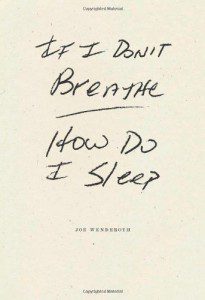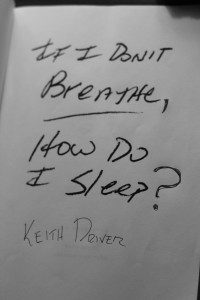
If I Don’t Breathe How Do I Sleep
by Joe Wenderoth
Wave Books, 2014
79 Pages
Preface
Some months ago I agreed to review Joe Wenderoth’s newest collection, If I Don’t Breathe How Do I Sleep. My editor, whose patience I have now strained to breaking, acquired a review copy of the book for me, gratis. Reader, I don’t know if you’ve ever seen a review copy of a collection of poetry. I don’t know if that term has any practical significance for you. In this case, it means the cover lacks art and blurbs and lacks even an indication of the book’s title and author.
Instead, it is plain, off-white, flimsy. On the bottom edge of the front, stamped in green ink is the name of the publisher, a warning that the book is an “uncorrected proof,” and a phone number. I have called the number (How could I not?), but hung up when someone answered. Still, I was, for a moment, comforted. To close an inscrutable book, a book that, when closed, is every book and none of them, and to call out, to know you can call out, and hear, while not the voice of the author exactly, a human voice! Every book should have this!
Reading and writing are lonely pursuits. Solitary pursuits. The same pursuit. That this loneliness and isolation can be dissolved! With a telephone! I confess I called the number often. Once, while in line at the Department of Motor Vehicles, I was denied my status as a human. Reader, we don’t need to get into how. What matters is that while waiting in that antiseptic, institutional space for a voice to call out my number, I called the number on the cover of this book. And I was comforted.
The problems with this review began early in the process: the book’s title appeared to be a question, but lacked a question mark. Was this an indication of the book’s “uncorrected” status? My copy’s table of contents placed every poem on page 000, but there is no page 000. Was this something to be “corrected?” Were these digits or letters? An ironic “ooo-ing” at every poem like the crowd at a fireworks display?
There were other issues: How was I to tell if this was the real book? Does the “corrected” copy differ significantly? Is there a “corrected” copy? Why have I been sent an “uncorrected” copy? Should I be correcting this book? Of course I should. This is my book. A book I am writing. I called the number to confirm my suspicions. When someone answered, I excused myself and hung up. Reader, by now you have surmised that to ask for confirmation would have been an act of cowardice.
I began making my corrections a few months ago. Small at first: scribbling notes in the margins, dog-earing pages, adding punctuation, underlining what I hoped were significant lines. But every morning, when I opened the book over breakfast, I couldn’t read my marginalia, couldn’t remember why I dog-eared certain pages, could not fathom what about the underlined passages had interested me.
Every day, I read a book annotated by a stranger. An illiterate. A vandal. Every day I resolved to write new marginalia, dog-ear different pages, underline other passages, hoping that the next day, I would remember, but every morning I cursed the fool who willed me this book, which is now largely illegible. Some pages have been folded multiple times. Every line has been underlined repeatedly and with such imprecision that it appears crossed out. I resorted to annotating my annotations with simple drawings, hoping this would combat my struggles with the legibility of my own hand, but the drawings are crude and, if I may be open and honest with you, primarily of a sexual nature.
I called the number late at night and listened to the answering machine. I called it in the early afternoon to hear someone answer. Every time, I hung up without speaking. My corrections—thoughtful, loving, collaborative in the truest sense of the word—were they not a disfiguring of the book? How could I explain what I had done and still insist that I valued our relationship, that it had been a balm to my sores? (I have so many sores, Reader!)
By this point my review was long overdue and the book, as you know, Reader (don’t pretend you don’t know), was gone. I was too ashamed to ask for a new review copy and certain, anyway, that I would just consume another in similar fashion. Obviously I had to write my own copy of If I Don’t Breathe How Do I Sleep. One with all the necessary punctuation. What follows is a review of that book, the book I have written. Is it a superior book to the one I received in the mail so many months ago? We can never know. That book is lost to history. All that remains is my book.

If I Don’t Breathe, How Do I Sleep?
By Keith Driver
79 Pages
What I have conceived is a book concerned with nothing less than the nature of human life and of human understanding. How have I done this? My book is bracketed by two poems: the first, “Satan Is Real,” is a question “I know/ you know/ how to sing/ but who taught you?” The second “The Difference Between the Living and the Dead” is an answer. The first wonders at the origins of voice, the second, in which the speaker tries to distinguish the recorded voices of the living from the recorded voices of the dead, ends “to tell them apart/ I have to listen less closely/ I have to remember what I know.” We, Reader, know what the speaker remembers.
But within these brackets I have conceived a discussion and dissolution of various membranes.
The membrane between the living and the dead. My book sees human life and experience as a ripple. The living and their lives are “the unsubsided,” a temporary disturbance in an otherwise smooth continuum with the dead.
The membrane between speaking and silence, which is everywhere pierced. In “Dean Martin Skit,” the speaker tells us that if we are men and we attend committee meetings (and who isn’t and doesn’t?), we will eventually be tempted to dress as women, will eventually “give in” to this temptation and “wear panties under our trousers,” will sit in our panties “dazed, radiating the uselessness of our secret glamour” as if “the substance/ and procedure [a procedure whose demands we defy in “Manufacturing Consent” by refusing to turn our syllabi in to the department secretary!]/ of this terrible place/ could be forgotten” as if “barks of attention” could drift in “gloomy quarantines” “possessed/ at least/ of silence.” This poem, I should note, begins as a wad of prose, which is gradually whittled, by a turn on “panties,” down to that final silence.
The membrane of the self. The membrane at the source of all pain and isolation. In “Letter to Dick Cheney” I contemplate my childhood proposal (made “to myself/alone”) that “the limited susceptibility of a nerve” to torture, which is “a clarification/ of reality,” was “proof / of some basic mercy.” But my daughter’s heartbeat, which is itself real and “mercilessly separate,” makes me think of Dick Cheney. The political implications of this notion of torture and pain and its relation to power are obvious. Reader, you will never hug your children (please acquire some children), the same way again.
The membrane of the self, which is lacerated and left to bleed. In “How to Visit Europe On a Budget” I travel by staring at my own nude figure in the bathroom mirror, “my eyes looking into my eyes.” I “run a straight razor across my forehead” and “let the blood drip down,” over an array of cheap action figures dumped in a sink. This, Reader, is true intercontinental travel.
There are critics who might describe these poems as spare or minimalist or austere. They will be wrong, Reader, because we both know that the book I have conceived is obese, expansive, grotesque, and built of a sentence—long, hypotactic, encircling– that tumbles through lines as if carried to its grammatical resolution by gravity, that resists punctuation, that pulls us in and presses us against its sweaty, flabby chest to feel how separate and lonely we are.
